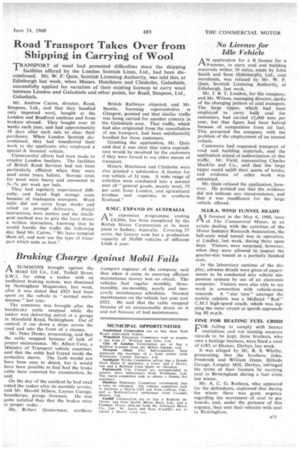Road Transport Takes Over front Shipping in Carrying of Wool
Page 37

If you've noticed an error in this article please click here to report it so we can fix it.
TRANSPORT of wool had presented difficulties since the shipping facilities offered by the London Scottish Lines, Ltd., had been discontinued. Mr. W. F. Quin, Scottish Licensing Authority, was told this, at Edinburgh last week, when Messrs. Hutchison and Chisholm, Galashiels, successfully applied for variation of their existing licences to carry wool between London and Galashiels and other points, for Real, Simpson, Ltd., Galashiels.
Mr. Andrew Cairns, director, Read, Simpson, Ltd., said that they handled only imported wool, bought at the London and Bradford auctions and from brokers abroad. They bought over 16 weeks each year, and had approximately 18 days after each sale to clear their purchases. When London Scottish discontinued, they had transferred their work to the applicants who employed a special-A licensed vehicle.
Unsuccessful efforts had been made to employ London hauliers. The facilities of British Road Services had not been particularly efficient when they were used some years before. Storage costs for wool were heavy and amounted to 5s.-7s. per week per bale.
They had regularly experienced difficulty, and faced high storage costs because of inadequate transport. Wool mills did not carry large stocks and relied on prompt deliveries. Postal instructions were useless and the intelligent method was to give the local driver a written instruction, knowing that he would handle the traffic the following day. Said Mr. Cairns, "We have sampled them all, and now use the type of transport which suits us best."
British Railways objected, and Mr. Beattie, licensing representative at Glasgow, pointed out that similar traffic was being carried for another concern in the Galashiels area. That traffic, which had also originated from the cancellation of sea transport, had been satisfactorily handled for these customers.
Granting the application, Mr. Quin said that it was clear that extra expenditure would be involved by the customers if they were forced to use other means of transport.
Messrs. Hutchison and Chisholm were also granted a substantive A licence for one vehicle of 34 tons. A wide range of activities were condensed into a normal user of "genera] goods, mainly wool, 75 per cent. from London, and agricultural produce and requisites in southern Scotland."
B.M.C. EXPAND IN AUSTRALIA
A N expansion programme costing fA20m. has been completed by the British Motor Corporation at its main plant in Sydney, Australia. Covering 57 acres, the factory now has a production capacity of 50,000 vehicles of different kinds a year.












































































































